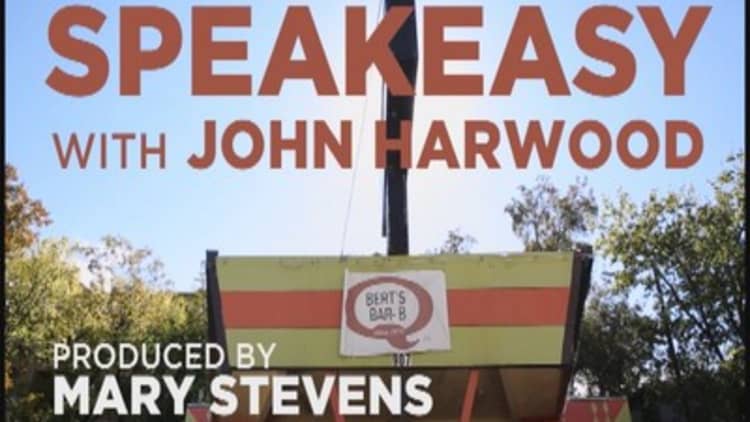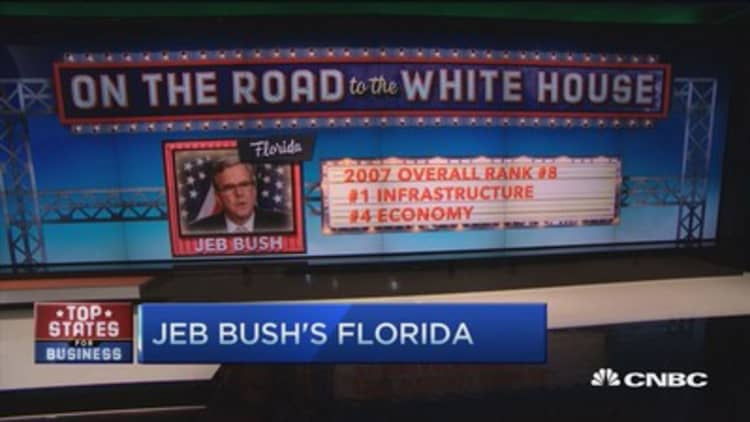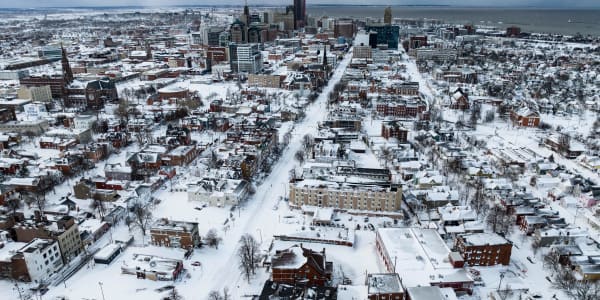Seventeen U.S. presidents previously served as governors—from Thomas Jefferson of Virginia to George W. Bush of Texas. All of them had to run on their record to some degree. But not one of them—not Rutherford B. Hayes of Ohio, Calvin Coolidge of Massachusetts, nor Ronald Reagan of California—faced the rigors of our America's Top States for Business study, which began in 2007.
Fortunately in 2016, with as many as nine current or former governors looking to the White House, we have a treasure trove of data to judge their performance—at least when it comes to business. Some will welcome the scrutiny. Others, not so much.
Read MoreAmerica's Top States for Business is coming soon!
Here's how some of the leading candidates and potential candidates did at the state level.
Rick Perry—Texas

Rick Perry's second run for the White House—perhaps even more so than his first campaign in 2012—is certain to lean heavily on his economic record in Texas. It's hard to blame him, at least based on our rankings.
Texas was America's Top State for Business three times during Perry's governorship—2008, 2010 and 2012—and never finished below second place while he was in office. When it comes to consistently solid performance year after year, no state has come close to Rick Perry's Texas.
Of course, Texas has some built-in advantages that would benefit any governor. It is a big state with a big economy that until recently benefited from huge demand and rising prices for oil and natural gas. It has a highly developed infrastructure, including two of the nation's busiest airports and a vital seaport. In short, Texas is a state no business can afford to ignore, no matter who is in the governor's mansion.
But give Perry credit—not just for not screwing things up but also for leveraging those built-in advantages and aggressively marketing his state, often to the annoyance of his fellow governors. Under Perry, Texas was a perennial leader in job creation.
Read MoreGood news for America's workers: You matter again
Our studies also expose some weaknesses under his administration, however. The state typically finished in the middle of the pack in education, with an average rank of 26th place. It is a relatively expensive state despite having no income tax, averaging a 30th place ranking under Perry for cost of doing business. And Texas averaged 32nd place for quality of life, in large part because of the state's dismal record on health insurance coverage.
Jeb Bush—Florida
Jeb Bush left office in Florida a few months before we published our first Top States rankings, but that 2007 study is largely based on data from his final year as governor. That means it shows what he left behind after two terms in Tallahassee.
Florida tied with Minnesota for 8th place overall that year—a respectable performance, and a rank the state has not matched since (Florida finished 20th in 2014).
Florida took the top spot in our Infrastructure category that year, thanks in part to a near doubling of the state infrastructure budget during Bush's governorship and a surge in shipments bound for Latin America. Florida's economy was booming as Bush left office, helping the state capture 4th place in our Economy category in 2007. But a major factor in the state's explosive growth was housing, which turned out to be a huge and ultimately devastating bubble.
Read MoreJeb Bush may be too honest to be president
Bush also left behind one of the most expensive states in which to do business, with expensive rents and utility bill- and high worker compensation costs. And in education, a perennial weak spot for the state, Jeb Bush left Florida in 37th place.
Chris Christie—New Jersey
The 55th governor of New Jersey points with pride to his business record.
"After years of decline, New Jersey's economy has turned around," Chris Christie's official biography declares.
But the numbers—including our America's Top States for Business rankings—tell a much different story.
New Jersey finished 43rd overall in 2014, with the 4th worst economy in the nation. The state has suffered nine credit downgrades during Christie's administration, when Moody's downgraded the state's bond rating to A2 from A1—and warned the worst may not be over.
"Without meaningful structural changes to the state's budget, such as pension reform that dramatically improves pension affordability, the state's structural imbalance will continue to grow, and the state's rating will continue to fall," the agency wrote on April 16.
New Jersey has also suffered nearly nonstop downgrades in our rankings since Christie took office in 2010. The year before, in 2009, the state had finished 24th overall.
In fairness, many of New Jersey's problems were not of Christie's doing. The state was still mired in the Great Recession when he took office, particularly tough on a state so closely tied to the financial services industry. The state's pension woes long predate the governor, as does New Jersey's crumbling infrastructure.
Read MoreCivil war in the American workplace
Nonetheless, the fact that New Jersey's ranking declined in six of our 10 categories of competitiveness during the governor's first five years in office likely will not make it into a Christie for President campaign commercial.

Scott Walker—Wisconsin
Wisconsin Gov. Scott Walker took office in 2011 with a pledge to revitalize the state's business climate, and he has been using some of the same rhetoric to lay the groundwork for a White House run.
How did he do in Wisconsin?
He certainly made waves, pushing through a ban on collective bargaining by most state employee unions—and surviving the resulting recall attempt—as well as making Wisconsin the nation's 25th right-to-work state. In our rankings, Wisconsin improved to 17th place overall in 2014 from 29th in 2010, the year before Walker took office.
But despite the outward signs of improvement, Wisconsin's fortunes—like so much else under Scott Walker—are not cut-and-dried.
The governor had promised his business reforms would add 250,000 jobs in Wisconsin by the end of his first term, but the Milwaukee Journal-Sentinel found the governor missed that target by a mile—or about 105,000 jobs. While job growth has accelerated in the past year, Wisconsin ranked near the bottom among its Midwest neighbors for job creation when voters went to the polls last fall. Year-over-year job growth at the time was just over 1 percent, roughly half the rate in Michigan and a quarter of the rate in booming North Dakota.
While Wisconsin has improved in six of our 10 Top States categories since Walker took office, the state has grown more expensive—dropping in rank in both our Cost of Doing Business and Cost of Living categories.
State legislators have had to struggle to close a projected $1.8 billion two-year budget gap, due in large part to Walker's business tax credits that did not pay off and revenues falling short of expectations. Walker has championed substantial cuts in education funding at a time when workforce has become a key battleground among the states.
Bobby Jindal—Louisiana
Given the challenges Louisiana faced after Bobby Jindal took office as the state's 55th governor at the start of 2008, it's a small wonder the state didn't fall in our Top States rankings.
Then again, the state didn't have much room to drop. It had finished 47th overall in 2007.
By the time Jindal took office, appealing to business in his inaugural address—"If you want to grow your company, Louisiana wants to grow with you"—the state was still reeling from Hurricane Katrina just over two years earlier. Another hurricane, Gustav, would follow later that year, with the global financial crisis immediately after that. In 2010 the Deepwater Horizon oil spill fouled the Louisiana coastline and crippled the state's petroleum, fishing and tourism industries.
Perhaps it is no surprise, then, that Louisiana has struggled to climb out of the 40s in our rankings. But it has not been for lack of trying.
Read More10 questions for Bobby Jindal
Jindal's economic development strategy has largely consisted of badly needed ethics reform, tax reform, generous—some say too generous—incentive programs and lots and lots of public relations.
Practically every plant opening or expansion, no matter how small, seems to warrant a press release from the state's hyper-aggressive Louisiana Economic Development office.
And the governor's office is happy to tell anyone who will listen that "since 2008, the Jindal administration has secured projects that are resulting in more than 91,000 new direct and indirect jobs and $62 billion in new capital investment across Louisiana."
The effort has dramatically improved Louisiana's standing in some opinion surveys of the state's business climate. But in Top States, which relies on hard performance data, traction has been much harder to come by.
No question there has been improvement under Jindal, most notably in Cost of Doing Business and Cost of Living. But the state continues to struggle in other areas, including quality of life, education and access to capital, keeping Louisiana stuck in the bottom tier.
Mike Huckabee—Arkansas
Mike Huckabee left office in January of 2007, so like Jeb Bush in Florida, our Top States rankings capture only a parting snapshot of his administration. But by then, Huckabee had 11 years to put his mark on Arkansas, and the final picture of what he left behind is not flattering.
Huckabee's campaign website proclaims, "He left a legacy of tax cuts, job creation, the reconstruction of his state's road system (and) K-16 education reform." Our numbers tell a different story.
Arkansas finished 36th overall in 2007, with the 41st-ranked economy and a tie for 40th (with Alaska) for education. The state's infrastructure ranked 44th, including one of the worst road systems in the country.
George Pataki—New York
The most recent Republican former governor to throw his hat into the ring, George Pataki left office on the last day of 2006. A few months later the state he left behind tied with Washington for 21st in our inaugural 2007 rankings.
New York was the most expensive state for business that year, and its heavily unionized labor force finished at the bottom of our Workforce category. But New York was tops in education as Pataki left office, and with the global financial crisis still more than a year away, New York came in 2nd in economy, just behind 2007's overall winner, Texas.
Read MoreFormer NY Gov. Pataki announces he will run for White House in 2016
Martin O'Malley—Maryland
Two-term former Maryland Gov. Martin O'Malley faces the daunting task of taking on Democratic frontrunner Hillary Clinton. He may also find it challenging to explain his state's performance year after year in our Top States rankings.
O'Malley is the only candidate whose entire tenure as governor is measured by our study. He took office at the start of 2007 and stepped down this past January.
Maryland ranked 35th overall in 2014 and averaged a 32nd-place ranking during O'Malley's eight years in office. Even when neighboring Virginia was leveraging its proximity to the nation's capital and an expanding federal government to capture our top honors in 2007, 2009 and 2011, Maryland finished near the middle of the pack—which O'Malley's critics often pointed out.
With one of the heaviest tax burdens in the nation, the state was consistently among the most expensive for businesses and individuals under O'Malley. It also ranked in the bottom 10 for business friendliness, which deteriorated during O'Malley's administration, according to our data.
But there were some notable bright spots. In education, Maryland is now a perennial top 10 finisher, including second place in 2013; the state had finished 26th in the category the year O'Malley took office. Maryland is also a leader year after year in our Technology and Innovation category, which plays into a central theme of his campaign.
And after years of lagging behind, Maryland has tied or outpaced Virginia for job creation three years in a row.
Lincoln Chafee—Rhode Island
Lincoln Chafee's party affiliation requires some explaining. He was a Republican until 2007, served as an Independent as Rhode Island governor from 2011 until this year, and will run for president as a Democrat. He may have an even harder time explaining his state's showing in our Top States rankings. Rhode Island finished dead last every year he was in office except 2013, when it managed to surge … all the way to 49th.
With high taxes and utility bills, Rhode Island is consistently among the most expensive states. Its economy has struggled, and its infrastructure is perennially poor.
Reacting to Rhode Island's last-place finish in 2014, Chafee insisted to CNBC, "We're on the rebound."
It may not be the most effective presidential campaign slogan.






